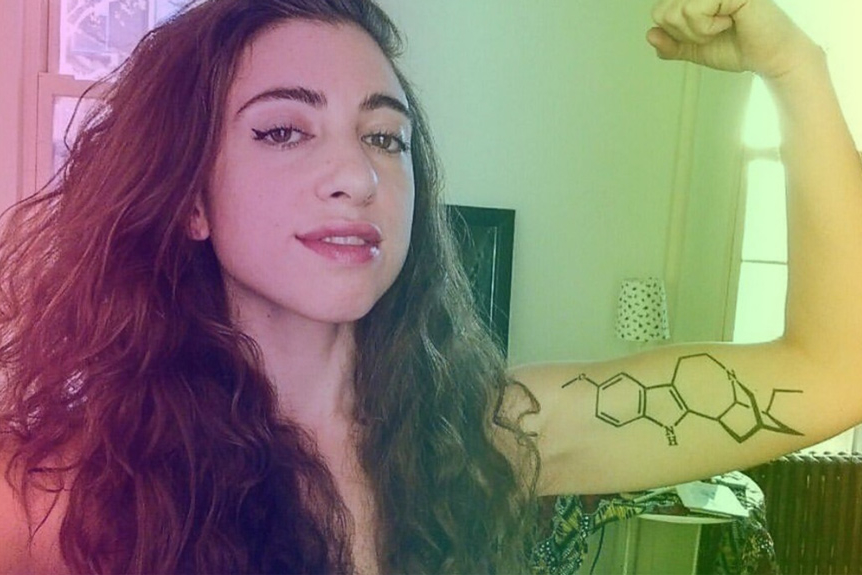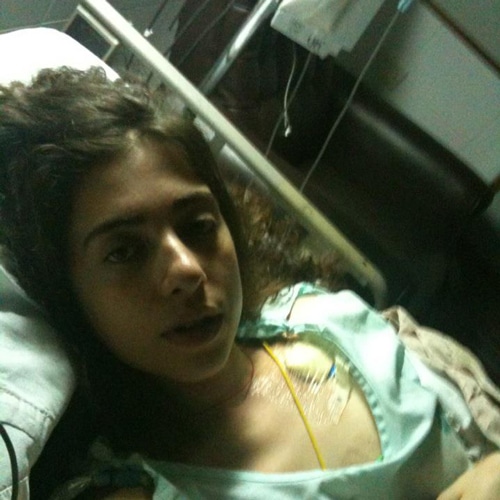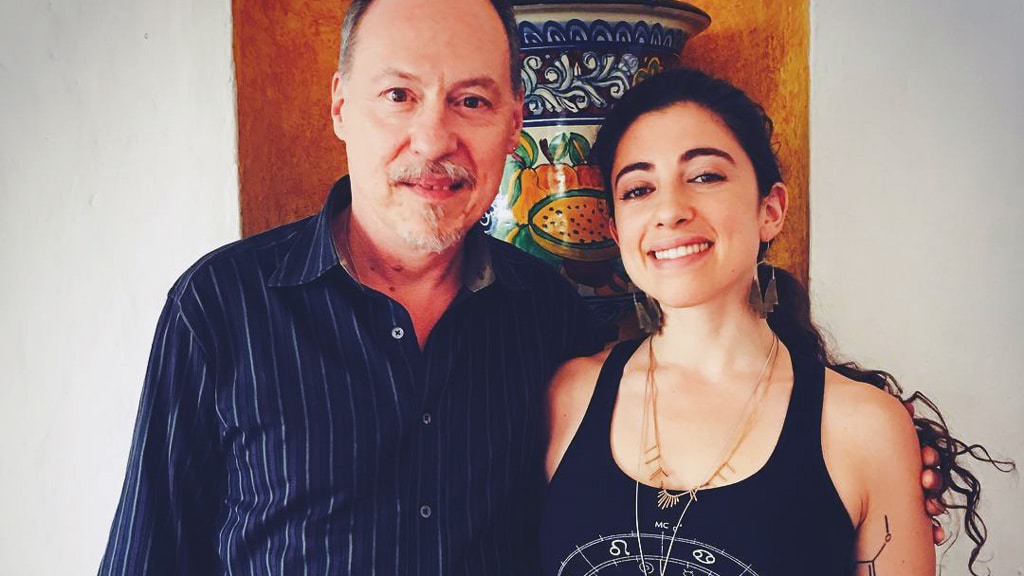How Not to Do Ibogaine 101 with Juliana Mulligan | Part 8
This is not a do-it-at-home type thing. Read the full series.

Psymposia is a 501(c)(3) nonprofit research and media organization that offers critical perspectives on drugs, politics, and culture. We rely on contributions from our readers and listeners. Your support is vital to sustaining Psymposia.
Support Psymposia’s independent journalism on Patreon and help us drive the Mystery Machine! We’re a bunch of meddling kids who are unmasking the latest shenanigans on the psychedelics beat.
Juliana Mulligan is a former heroin/opiate dependent person, formerly incarcerated, and an overdose survivor. She has also worked as an ibogaine provider and is currently an ibogaine educator who has presented at multiple conferences. Juliana is studying to be a therapist at the New School in New York and is developing a new project called the Peer Counseling Network, which will provide free peer counseling to individuals who have had ibogaine treatment and cannot afford therapy.
You had a pretty remarkable encounter with ibogaine. What was your experience like, and what led you to try it?
I was an opioid-dependent person for 7 years, from when I was 20 to when I was 27.
I had been through all of the typical mainstream treatments. I went to jail and was sent to rehab there, and of course I went to a million 12-step groups. I kept trying, but none of it ever really clicked for me.
I would have periods of time where I wouldn’t be doing opiates. When I was 25, I went to India for a while and wasn’t doing any drugs there, and then after that I moved to Bogotá, the capital of Colombia. I wasn’t doing any drugs when I first got there, but I figured out pretty quickly that I could buy whatever prescription opioids I wanted over the counter with no prescription, which was quite a discovery for an opiate enthusiast.
I kind of just went to town. I had all the fentanyl I could want, all the morphine, Dilaudid, all of it.
Somehow, I had always been close to psychedelics from a young age. My first acid trip was at 15. I don’t know why, it was just like a random thing, but I always had these people around me who were very interested in psychedelics. So I had actually heard about iboga maybe like 3 or 4 years before I used it.
When I was in Colombia, I was on really high amounts of fentanyl. I finally got to the point where I had as many drugs as I could want and I was like, “You know, this actually sucks. I’m in a really dark place and it’s time to get out of this.” I knew I needed to figure out how to take ibogaine.
I didn’t really want to tell my family what was going on because I had already put them through so much and I thought they were probably exhausted with me. A good friend talked me into telling my mom that I wanted to try ibogaine, and my mom said, “Yes, let’s do it.” No question about it. She just knew that it was the right thing.
So I called around and found this clinic in Guatemala City, and I clicked with the guy on the phone more than I did with people at other clinics. He has a bad reputation in the ibogaine community because he has a lot of adverse events and fatalities, but I didn’t know that at the time. So I pretty much left my life in Colombia and flew to Guatemala.
I arrived in Guatemala City and…knowing what I know now about ibogaine, the clinic staff basically did everything wrong. My drug of choice was fentanyl. Someone should be off fentanyl at least 2 weeks before taking ibogaine. They gave me some OxyContin when I got there so I wasn’t sick, and the next day they gave me ibogaine – which is not what you should do. You really need to stabilize people and watch them for at least 5 days to see where they’re at health-wise, see what their tolerance is, see if maybe they were doing some other drugs that they didn’t tell you about.
So they began giving me ibogaine. [They said] the withdrawal would subside – but it wasn’t subsiding, so I started freaking out. The doctor gave me a bunch of Valium and I don’t really remember anything else after that, until I was throwing up and being taken to the bathroom by the nurses.
I had a kind of whiteout. When I came out of it, they had called paramedics because they couldn’t get an IV in my arm. I guess my EKG wasn’t good, so they took me to the hospital.
It was a state-run Guatemalan hospital and it was like a warzone inside. I remember trying to ask for water and they told me they didn’t have any. They X-rayed me, which seems like an odd choice of test given that it was a problem with my EKG, and then they said, “We can’t deal with this right now,” and they sent us on our way.
We went to a second hospital that turned us away, and the third hospital was like a smaller private hospital. They kept me for maybe like 6 hours and did a series of EKG’s. They seemed to get better, so they released me. We went back to the clinic and I vaguely remember trying to Skype someone, and then they were saying my EKG was really bad and I don’t remember anything after that.
I was told later that we got to a fourth hospital that wasn’t really taking us seriously. We were in the emergency waiting room and apparently I went to the back and just collapsed.
What happened was that I went into cardiac arrest. This is something that’s completely avoidable if you follow safety protocols with ibogaine, but they didn’t follow any of them. Come to find out later, I had about twice the dose of ibogaine that you should ever give anybody. So my treatment is basically ‘How Not to Do Ibogaine 101’.
I had 6 cardiac arrests over a 24-hour period of time and I was put on an external pacemaker for about 10 days in the ICU.
When I woke up, all I could think was, “I’m not in withdrawal right now. How is this possible?”
I didn’t care that I’d had a medical emergency. I just knew that I wanted to work with ibogaine in some capacity. I felt like something really huge had been lifted off me, like I had broken free from something. I didn’t feel guilty, I didn’t feel bad, I just felt as if I had found the final piece of the puzzle.
So even though I didn’t have that huge visionary experience that a lot of people have with iboga, it was like a lightbulb finally got turned on, and I was just on fire about life.
They took me off the pacemaker after about 10 days in the ICU. I was fine. There was no damage to my heart.
I guess it would have been a year later, I went to my first ibogaine conference. I remember figuring out, “Oh, my treatment went wrong because they totally screwed it up, they didn’t do what you’re supposed to!”

You didn’t have any visions at all?
I did eventually remember a vision maybe like 3 months later, as I was falling asleep one night.
When I was getting all that Valium, the room looked like it had turned into this decaying hospital room, and I was on a table with a bunch of wires going into me – which is interesting because that’s how I woke up at the end of the ibogaine experience. In this vision, I got up on the table and pulled out all of the wires. I went over to the window and looked out onto this grey-brown, post-apocalyptic, decaying city. I went to climb out of the window, and I knew that I was escaping from the psychic trap I had been in with opiates.
So even after all that, you’re still an advocate for ibogaine treatment?
100%. Especially for opiates, I think it’s the future. It’s the only thing in the world that takes away withdrawal, other than more opiates.
Not only does it do that, but, for me, I felt reborn after. I was so excited about life. I got out of the hospital, and I was cooking food for the whole clinic. I was just excited and motivated and filled with a new life force. I had quit opiates maybe 30 other times before, and usually you do not feel excited about life. Even 6 months later you don’t feel excited about life because of the way that opiates fuck up your brain chemistry. Ibogaine resets everything somehow, and we don’t really understand how it works, what the reset mechanism is, but something big happens. It takes years to happen coming off of hard drugs usually, but this happened overnight for me.
This drug is miraculous.
Do you know if that provider is still offering treatments?
Yeah. I’ve heard through the grapevine of 2 other fatalities he’s had over the past 3 years. What’s hard for me about this is I don’t actually want to villainize him because even though they didn’t do my treatment right, he stayed with me the whole time I was in the hospital. This guy has a really big heart and my experience really affected him deeply.
But he is not practicing safely and people are dying, and that’s obviously not acceptable. It’s tough because ibogaine is in this legal grey zone, so anyone can open a clinic, but if you’re not following safety protocol, anyone could die – even if you have no pre-existing conditions. I didn’t have any pre-existing conditions. This is not a do-it-at-home type thing. I don’t even suggest doing it underground, in the US, with experienced people. Just go to a medically staffed clinic.

Given that you had to fly to another country for ibogaine treatment and had this adverse event, what are your thoughts on its regulation in the United States? What would the ideal regulatory framework for ibogaine treatment look like?
It’s complicated. First of all, the FDA doesn’t approve one-time treatments like ibogaine. If ibogaine gets approved, they’re gonna figure out a way to make it something that you have to come back and do a bunch of times, and they’re gonna charge 20 grand each time. That’s what concerns me about bringing ibogaine into our medical framework.
There’s already doctors trying to make a maintenance patch out of 18-MC [a non-psychoactive analog to ibogaine], and anything that helps with opioid detox is great, but the total experience of ibogaine is so important. So already they’re picking it apart to make it profitable.
I think, for ibogaine treatment to be adapted in this country successfully, our whole system has to shift. I’m conflicted about it. I want as many people as possible to have access to it, but I don’t want to see ibogaine exploited for profit the same way every other medical treatment is.
Though your experience with it was different from most, how would you compare the visionary aspects of ibogaine to other psychedelics?
Well I did do it again 2 and a half years later. I went to go work at an ibogaine clinic in South Africa and did another flood dose there.
Comparing it to other psychedelics, it’s just totally different. Ibogaine is an oneirogen [causing waking dream states], so it’s a whole other thing. That second experience was harder for me psychologically than my detox treatment. It unraveled a lot of anxiety and depression that I was dealing with, and I was kind of spun out for a few weeks. So I actually think that ibogaine is potentially a lot harder than other psychedelics.
I didn’t have a lot of support or people to talk to after that experience in South Africa. I think it’s really important to be in therapy or have some kind of group to be there with you afterwards. You really have to be prepared. If you take ibogaine thinking, “I want to fix this,” the way ibogaine helps is that it’s going to bring up the worst of that issue, put it all in your face at one time like, “Okay, here you go.” Sometimes people do have that miraculous ibogaine experience, but pretty much everyone has at least 3 days of having a really hard time afterward. It’s not a weekend thing, you really have to be prepared for this.
What are you working on these days?
I’m in school right now to become a therapist, to do ibogaine related work. I’m also starting this thing right now called the Peer Counseling Network. People go and take ibogaine, and a lot of people barely scrape together enough money just to go and do it. They come home, and they don’t have the resources to go to therapy, and the only free support available is with 12 step meetings, which has like a 5% to 8% success rate and doesn’t recognize ibogaine as being legitimate because it’s a drug. So what I’m trying to do is to build a network of people that are basically going to be amateur therapists to help people integrate their ibogaine experiences over the phone.
So far it’s me, Kevin Franciotti, and a couple other friends who are all in school to do therapeutic work. The main focus is for people that have done ibogaine, but I would be open to bringing in other psychedelics as well in the future. I really want to focus on ibogaine for now because a big question facing the community is, what do we do with people afterward?
A lot of people do it, they go home to the same life they were living, and they relapse because they thought ibogaine was just going to be magical and fix everything, and it’s not. You really need to have a plan for afterwards. I hate hearing about people going home and not having any support, so I really want to offer this as a free form of support.
Read Part 9: How safe is ibogaine? We asked Clare Wilkins who has facilitated over 700 treatments
Hey! Before you go… Psymposia is a 501(c)(3) non-profit media organization that offers critical perspectives on drugs, politics, and culture. We strive to ask challenging questions, and we’re committed to independent reporting, critical analysis, and holding those who wield power accountable.
Our perspectives are informed by critical analysis of the systemic crises of capitalism that have directly contributed to the unmitigated growth of addiction, depression, suicide, and the unraveling of our social relations. The same economic elite and powerful corporate interests who have profited from causing these problems are now proposing “solutions”—solutions which both line their pockets and mask the necessity of structural change.
In order for us to keep unpacking these issues and informing our audience, we need your continuing support. You can sustain Psymposia by becoming a supporter for as little as $2 a month.
Jordan May
Jordan May is a writer who explores the intersections between drug policy, psychedelics, and community engagement.





